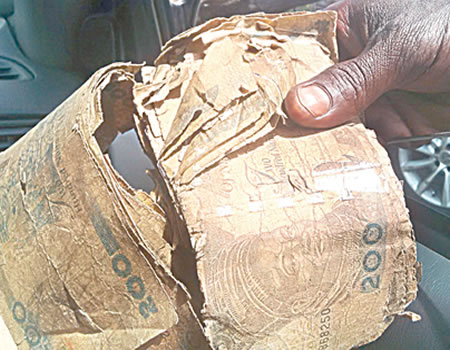
THE state of the Nigerian currency, the naira, is to all intents and purposes appalling. Not only has its value regularly plummeted against other currencies like the dollar, the pound or the euro, the physical state of its various denominations attests to both its weakness and the parlous state of the country’s economy. Many of the naira notes in circulation are ragged, smelly and veritably disused to the point of being regularly rejected during various transactions, their status as legal tender and symbol of national sovereignty notwithstanding.
Only recently, a laboratory analysis of N100 notes picked randomly revealed that they harboured pathogenic and non-pathogenic bacteria colonies like bacillus, staphylococcus aureus and candida. The examination also showed a high presence of germs. In plain terms, dirty naira notes are harbingers of ill health and possibly death in installments. Of course, there are several reasons for the preponderance of dirty naira notes, from the people’s deplorable attitude to the handling of the currency to the corruption embedded in the sale of the newly minted notes which have found compulsive use in the vanity fair of “spraying” at parties.
Fresh notes that are not available for commercial transactions are readily obtainable to those who wish to lavish them on people at parties at a minimum commission of 20 per cent. Although people complain about dirty naira notes, there is often a surfeit of new notes at party scenes and under the various intersections on the highways, pawned by touts. Of all the dirty denominations, it would seem that the 100 naira note is the chief culprit, being the most frequently pawned and abused.
We recall with indignation, the busted syndicate in the Central Bank of Nigeria (CBN) whose members were given various jail terms for recycling naira notes earlier scheduled for destruction. Without doubt, such practices are still rife within the system. There was a time when dirty and disused naira notes were systematically withdrawn from circulation without any fuss, but now that the commercial banks are reluctant to pay the CBN a token charge in exchange for new notes, the notes have remained in circulation.
The practice of making brisk business out of the sale of the country’s currency in any guise must be discouraged by the CBN. It has be en observed that certain felons are in the business of carting away these dirty naira notes from the South where they are usually rejected to the North where they are still accepted as legal tender. Of course, it is easy to see that these businesses are being fuelled by contrived scarcity and restrained distribution of new notes. Were the CBN resolute about it, it would be possible to mop up these dirty and disused notes from circulation for the sake of the country’s image which is being sullied by their preponderance. The CBN must punish severely, any commercial bank that is unwilling to comply with the extant rules on dirty notes.
The CBN’s recent warning that those who ‘spray’ naira notes at parties risk going to jail for six months or paying a fine of N50,000 or both is a step in the right direction. Not only is it expected to deter people from faking a nonexistent high status, it will also compel the populace to confer some respect on the currency. Enforcing compliance with the extant laws on handling the naira will rein in the overindulged who are hard of hearing. The CBN certainly has its work cut out for it in mopping up dirty naira notes.
END

Be the first to comment